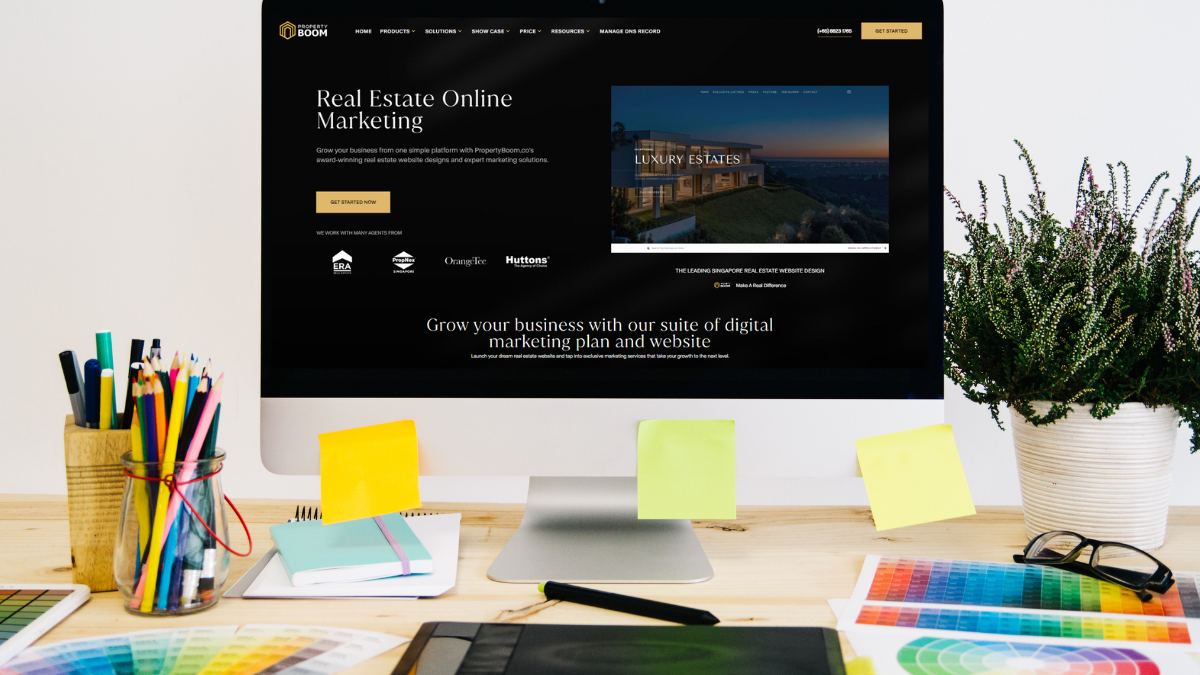


Your real estate website is your digital identity as a agent—it’s how you showcase your listings and introduce yourself to potential clients online. That’s why you need an online presence that stands out from the crowd in a competitive market. But with so many choices and details, it’s easy to feel overwhelmed.
At PropertyBoom Singapore, we create beautiful and award-winning websites for agents. In this guide, we’ll teach you everything you need to make an amazing real estate website. From stunning website design to search engine optimization (SEO), you’ll learn the components you need to build a high-performance website that helps you grow your real estate business faster, smarter, and easier.
Whether you’re starting from scratch or revamping your existing website, we’ll show you how to make a website that attracts your audience and converts visitors into clients.
Having a strong online presence is more important than ever in today’s digital world. That’s why so many real estate agents have their own websites. But, before you start making your agent website, you need to understand how it can benefit your brand.
Businesses today depend on the internet for everything. Why? Because that’s where the customers are. Smaller businesses and agencies report a growth increase between 15% and 50% from using a webpage service. And to further support that point, 91% of customers have been recorded saying they prefer an online experience with the businesses they use. Having an online presence, especially through a website, can do wonders for your traffic.
A good example of the impact of an online presence on increased traffic comes from a case study on a specific Singaporean website specializing in realty. The study shows an organic reach of close to 500k with just the simple execution of a basic homepage design. This growth further increased to 2.4m following actionable steps in SEO, website design, link building, and other similar services you can find with PropertyBoom Singapore.
The right real estate website of PropertyBoom Singapore can also boost your lead generation efforts. Think about it: most people use the internet when searching for answers to something. If you can identify your target audience’s pain points and provide helpful solutions, quality leads will come to you for answers.
By positioning your website as a valuable resource page, your audience will not only recognize you as an expert in the real estate industry but will also begin to build a trusting relationship with your brand. And when they need a real estate agent, you and your brand will be their first choice. You can also encourage them to convert by placing strategic call-to-actions (CTAs) on your webpage.
Customer education is equally important to a real estate business. You can make sure your customers know what they need to by providing the right resources to compare and contrast on your website.
An effective way to educate your audience is to include blogs, videos, podcasts, and more so that your customers can see what goes on behind the scenes at a real estate agency. Once they understand what you can do for them, they’ll be more likely to call on you when they need realty services.
Your website can also serve as a communication channel for your business. Use a contact form and integrate a live chat system to allow 24/7 open communication with your customers.
You can also link your company’s social media pages to your main website to further facilitate engagement with your audience. Connecting to your social media platforms allows for quick problem-solving or post-sales servicing which serves as a gold mine for advancing your lead generation efforts.
Having a website makes it incredibly easy to extract customer data and analyze your target audience so that you can serve them better. Websites can now be linked to a myriad of integrations that compile the data into easy-to-use charts and tables—allowing you to see which of your marketing strategies are working and which aren’t.
PropertyBoom Singapore's tools also provide you with a picture of your customers’ average daily website usage patterns and how they perceive information about real estate. Do they prefer detailed, technical explanations of what to expect when buying a house? Or are they the more casual types who just want to know the main points?
Having a website adds credibility to your business and the services you offer. Including things like testimonials, reviews, and even blog posts can significantly boost trust and strengthen your rapport with your loyal and potential audience pools. Not to mention, websites do wonders for your brand awareness scores too.
Check out some of the amazing real estate websites we’ve designed for our clients.
Now you understand the benefits a simple collection of landing pages can bring you, it’s time to go over the features that make an amazing real estate website.
Web design is the process of planning, conceptualizing, and executing the basic structural arrangements of your home page and other supporting pages. It involves designing both the aesthetic aspects and the navigational ones. With more consumers spending their time on their smartphones and handheld devices, website design now includes developing mobile-compatible pages.
User interfaces are the front-end aspects of a website that you get to see and interact with. The menu items, tabs that take you places, contact forms that help you send messages, and even nifty animations are part of the UI/UX. As you know, webpages are made up of code. The UI/UX layer helps mask this messy jumble of words and numbers to keep the “front door” to your website clean, simple, and, most importantly, easy to use.
Website copy is the core content of your landing pages, a.k.a the text that tells the story of your brand, what it does, and what it offers. Website copy isn’t to be confused with website content, which is filler text that conveys ideas and concepts about your realty niche, like a blog post. The main duty of copy is to help convert leads to successful sales.
SEO, or search engine optimization, is a group of strategies and processes that, when done correctly, propel your website to the highest position in search result pages. SEO applies to any search engine—Google, Bing, Yahoo, and Youtube (yes, YouTube is a search engine!)
Social media and web design are inseparable elements when building an effective and engaging real estate agent’s website. Any 21st-century business needs to integrate social media into its marketing plans. Through social media, you can share information on properties, industry and market news, clients’ success stories, company milestones, and new listings.
The IDX is a plug-in software that contains standards, best practices, and policies related to displaying the information in real estate listings on websites. This powerful tool allows agents and brokers to integrate listings from the Multiple Listing Services (MLS). With the MLS, real estate agents in a particular location can upload, share, and manage local listings.
You have learned everything you need to know about website building for the real estate industry. Now you are ready to create your own powerful and engaging web pages. Pay attention to your website’s key elements: the site design, UI elements, UX pathways, page copy, and SEO techniques.
Our checklist will help you stay on track when building your professional and lead-generating real estate website. If you need a partner to work with you from start to finish when building, designing, and launching your website, our real estate website design team is here to help. Contact us Today!!!